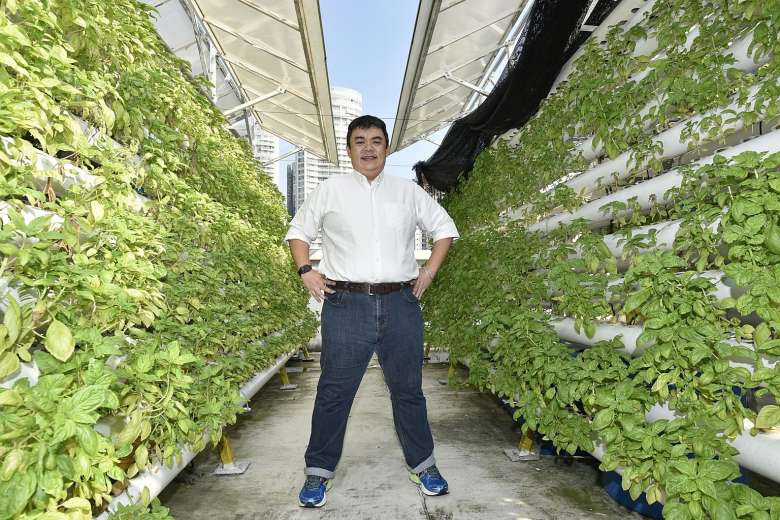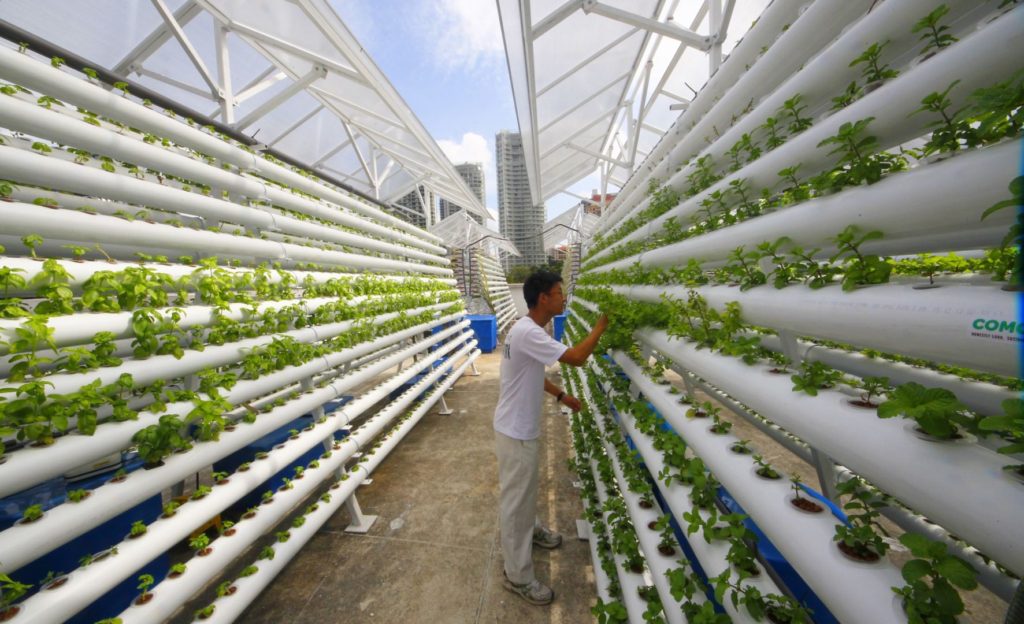Comcrop founder believes that urban farming can deliver social good along with fresh produce. While most of his peers settled down in nine-to-five jobs, 43-year-old Allan Lim became the chief executive and owner of Comcrop, Singapore’s first urban rooftop aquaponic farm.
Located on the rooftop of *SCAPE, a shopping centre in the heart of Orchard Road, the farm now provides fresh produce to establishments that include the Shangri-La and Raffles hotels.
The farm, located in the middle of Singapore’s shopping district, employs a vertical aquaponic farming system to grow its crops in a sustainable and efficient manner.
The plants are watered through an intricately designed automated pump system, which directs water from tanks into the farm’s ecosystem.
Aquaponics involves creating a symbiotic system, in which small aquatic animals provide nutrients for the plants, and vice versa.
Crops like basil and peppermint grow abundantly from vertical racks, and are tended to by several senior citizens and volunteers.
The crops from these racks alone provide over 150kg of produce per month – enough to garnish over 20,000 plates at a restaurant for a year.
Meanwhile, tilapia fish inhabiting large tanks on the farm’s premises provide fertiliser for the plants.
The technology utilised on the farm facilitates a self-sustaining ecosystem that does not employ any chemicals or pesticides in the farming process.
Apart from elderly workers, Comcrop also hires students with learning disabilities, giving them the opportunity to learn how to grow crops and earn some money at the same time.
“In 2011, I noticed a general dissatisfaction in Singapore. I wanted to create a communal activity, involve youth in agriculture, and interweave social good into a business model,” said Mr Lim.
He explained that the idea to build a rooftop farm addresses two problems present in Singapore today.
“Firstly, Singapore is quite resource-constrained. Secondly, we don’t really have a lot of knowledge about ground farming,” he said.
“By gravitating towards using technology, we can be more sustainable and use less labour.”
The farm’s prime location also allowed for the development of an efficient supply chain. By situating an urban farm just a stone’s throw from the hotels it supplies, Comcrop has the capability to harvest fresh vegetables on the same day and guarantee the freshest possible produce for its clients.
Meanwhile, Mr Lim is looking to take Comcrop to the next level. He has his sights set on building a full-scale farm on a 3,500 sq metre location in Woodlands, with the aim of supplying food production centres and catering companies with leafy greens.
Mr Lim’s efforts are very much in line with the Government’s vision to make Singapore a more sustainable and eco-friendly nation.
Asked if the vertical rack aquaponic farm could become a ubiquitous part of the local housing landscape, Mr Lim said he was optimistic that one day, the roofs of HDB estates and multi-storey carparks could house similar urban rooftop farms.
Mr Lim acknowledges that even with the increased buzz around smart cities and sustainable living, food does not quite come to mind in conversations about sustainability.
“I really think urban farming has a place in Singapore, especially when we have 95 per cent of our food imported,” he said.
“Singaporeans should have the audacity to imagine that one day, we can provide 100 per cent of our own food.”
Correction Note: An earlier version of this story said that Mr Lim is planning to build a full-scale farm on a 3,500 sq ft location in Woodlands. It should be 3,500 sq metres. It has been corrected.
Source: straitstimes





Leave a Reply
You must be logged in to post a comment.